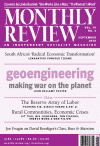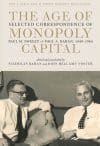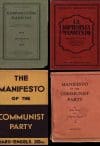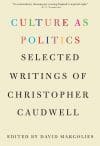Marxism

Founded in the late 1960s and recently revived, the radical organization Science for the People did—and does—far more than just publish a magazine. Chapters are forming around the country, including physicists, engineers, and biologists, as well as representatives of other scientific groupings and social movements. We at MR welcome the return of this great publication and movement of the U.S. left. | more…

A Letter to István Mészáros from Paul M. Sweezy, October 16, 1992
In October 1992, MR founding editor Paul M. Sweezy wrote the following brief letter, published here for the first time, to István Mészáros in response to an interview with Chris Arthur and Joseph McCarney that had just been published in Radical Philosophy. Sweezy saluted the critical significance of Mészáros’s argument on “the monstrous power of capital,” and the failure of many Marxists to perceive this problem in its full dimensions. He also affirmed the imperative of incorporating the ecological economics of Nicholas Georgescu-Roegen.

In his insightful new book, the historian David Roediger raises critical questions for scholar-activists seeking to understand white racism and contemporary capitalism and its class realities. He joins a long line of thinkers who have clearly recognized the need for both specifically racial and more universal, class-oriented programs of major social and economic change. | more…

Paul A. Baran (1910–1964) and Paul M. Sweezy (1910–2004) were two of the most creative and influential Marxist economists of the last century. The Age of Monopoly Capital collects hundreds of letters between Baran and Sweezy, written between 1949 and Baran’s death in 1964. The correspondence contains numerous interesting, important, and unanticipated ideas. Nuggets of wisdom about economic theory, socialist history, dialectical method, academic politics, and many other topics are scattered throughout. | more…

Instead of theory, early U.S. radicals excelled in reportage, like John Reed’s Ten Days That Shook the World, or fiction, like Upton Sinclair’s packing-house shocker The Jungle. To Europeans American thought seemed impermeable to the difficult ideas of Marxism. That changed with the founding of Monthly Review in 1949, which marked a newly realized if not entirely new trend in American Marxist thought. | more…

Against attempts to characterize Marx as a dogmatic and deterministic thinker, it is precisely the open-endedness of his criticism that accounts for historical materialism’s staying power. This openness has allowed Marxism to continually reinvent itself, expanding its empirical and theoretical content and embracing ever larger aspects of historical reality. | more…

Thoughts on the Transition between Modes of Production on the Occasion of the Marx Bicentennial
Revolution is still on the agenda for the global periphery. Restorations in the course of socialist transition are not irrevocable—and in the weak links of the center, breaks in the imperialist front are not inconceivable. | more…

The Manifesto‘s analysis of the capitalist crises that “put on its trial, each time more threateningly, the existence of the entire bourgeois society” remains central to any attempt to predict the events of the coming years. | more…

Jane Lazare has written a fascinating, intensely personal book about history, family, and the Communist Party in the United States. She knows this story well: her father was an active Communist organizer, and the memoir recounts his life and hers, and the connections between them. | more…

The Marxian critique of political economy is inseparable from the “labor theory of value.” But what exactly does this theory mean? This article considers Marx’s value theory from five perspectives: as a monetary value theory, a theory of exploitation, a macro-monetary theory of capitalist production, a theory of individual prices, and a theory of crises. | more…

Considered by many to be the most innovative British Marxist writer of the twentieth century, Christopher Caudwell was killed in the Spanish Civil War at the age of 29. Although already a published writer of aeronautic texts and crime fiction, he was practically unknown to the public until reviews appeared of Illusion and Reality: A Study of the Sources of Poetry, which was published just after his death. A strikingly original study of poetry’s role, it explained in clear language how the organizing of emotion in society plays a part in social change and development. Culture as Politics introduces Caudwell’s work through his most accessible and relevant writing. Material will be drawn from Illusion and Reality, Studies in a Dying Culture and his essay, “Heredity and Development.” | more…

Unlike such obvious forms of oppression as feudalism or slavery, capitalism has been able to survive through its genius for disguising corporate profit imperatives as opportunities for individual human equality and advancement. But it was the genius of Karl Marx, in his masterwork, Capital, to discover the converse law of surplus value: behind the illusion of the democratic, supply-and-demand marketplace, lies the workplace, where people trying to earn a living are required to work way beyond the time it takes to pay their wages. Leave it to the genius of Samir Amin to advance Marx’s theories—adding to them the work of radical economists such as Michal Kalecki, Josef Steindl, Paul Baran, and Paul Sweezy—to show how Marxian theory can be adapted to modern economic conditions. | more…











